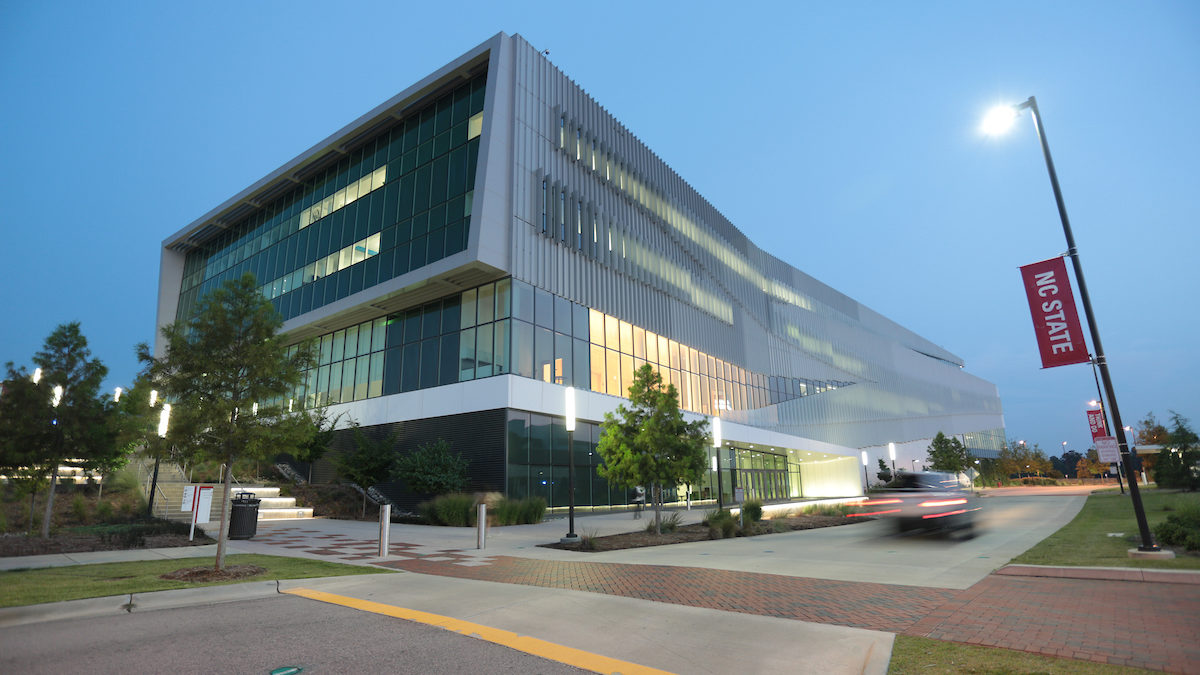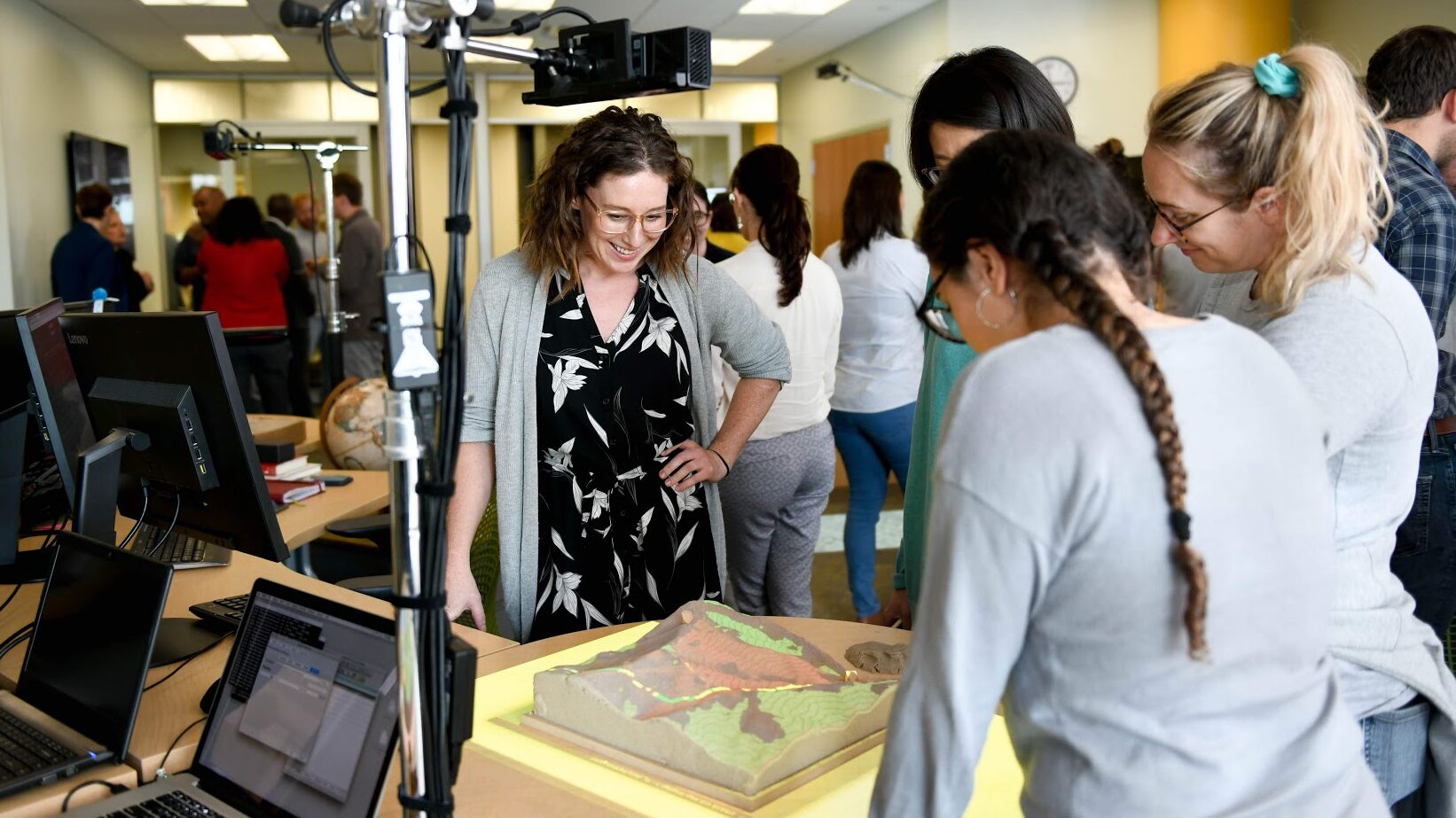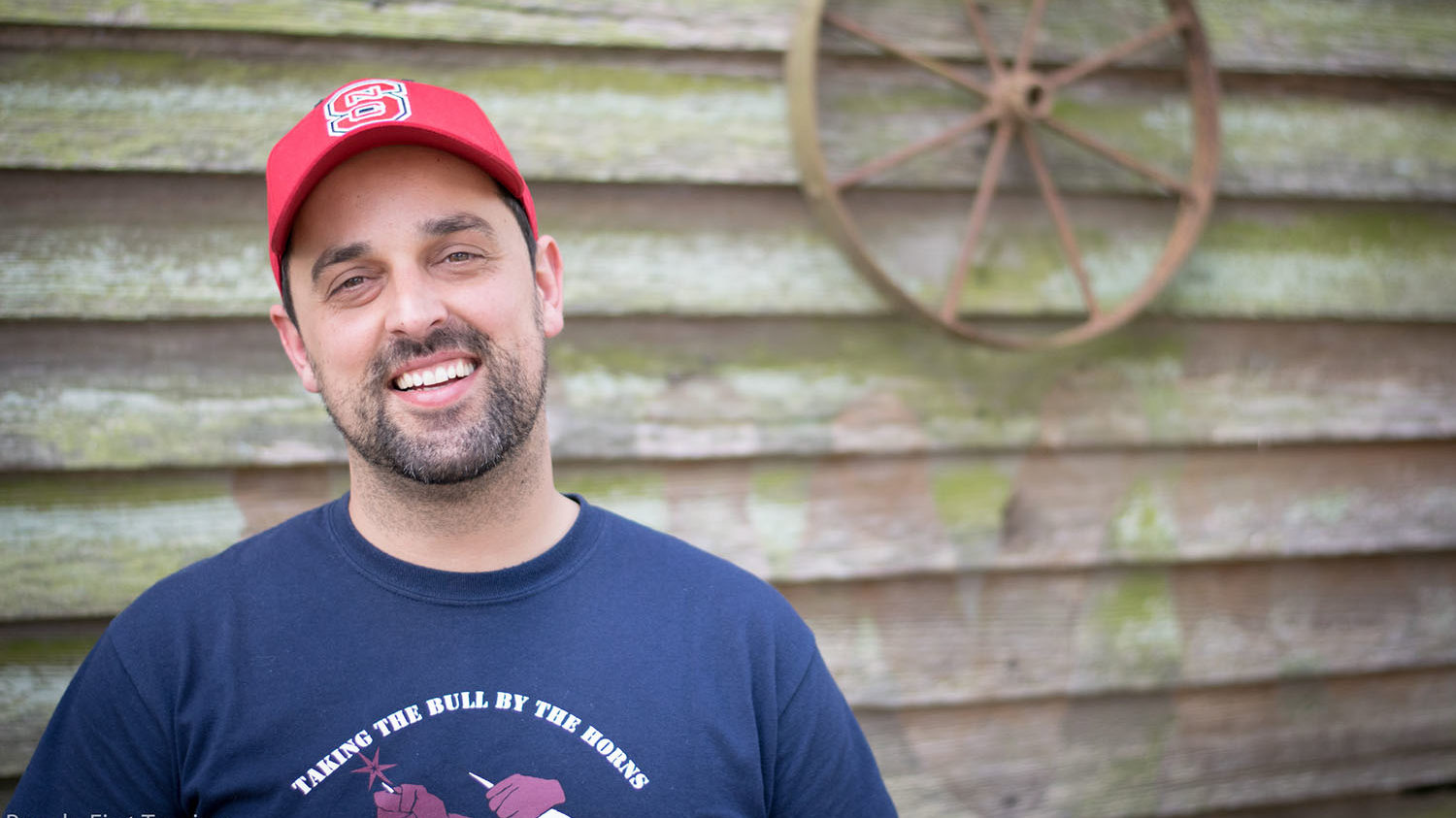Amanda Walter: Proud Graduate, Proud Woman
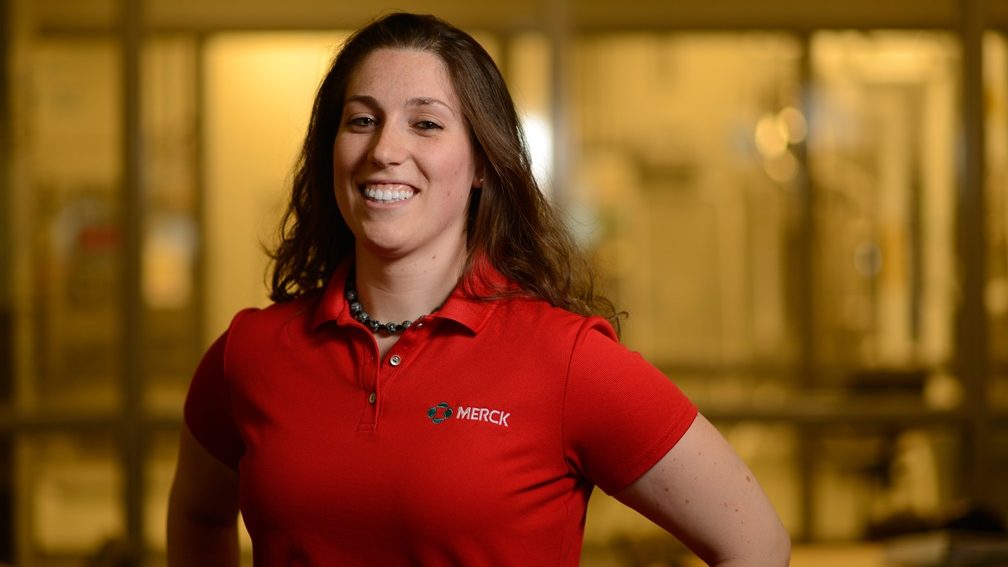
Taking her place in science
Walter believes that graduate studies at NC State lent her scientific credibility and eventual access “to the very people who determined whether or not pharmaceutical companies can market biosimilar drugs.”
Drug terms like generic and biosimilar can be confusing if not bewildering to the layman.
NC State graduate Amanda Walter, who works in the pharmaceutical industry at Merck, jumped at the opportunity to speak with policy and lawmakers on the topic of biosimilar drugs. She wanted to help clarify and parse out the terms for people in a position to enact the laws that govern them.
Although the science behind a biosimilar drug versus a name drug may not be transparent to all, the economics are clear. Biosimilar drugs, as Walter explains, “can cost one third less than the cost of name drugs.” That savings can determine whether or not a patient can afford to remain compliant with a drug therapy. Compliance can be a matter of enormous
importance for thousands of patients.
Today, Walter works at Merck as an engineer, where she investigates product deviations for the vaccines manufactured here in NC. “It is immensely gratifying to be part of a team that helps manufacture products that ensure the health and wellness of patients around the world,” she says. “Furthermore, studying at NC State and working within the RTP area has energized me to achieve my long-term career goal: being part of team that develops the next therapeutically significant biologic.”
For Walter, now 28, NC State was the culmination of all she has been working towards. “I firmly believe my time at BTEC has made me a strong competitor in the workforce pool.” BTEC, or the Biomanufacturing Training and Education Center, offered a graduate program directly affecting her career progression within the pharmaceutical industry.
With a background in biology, Walter says her undergraduate focus was more on the principles of the scientific method and the underlying principles of biology, chemistry and physics. But Walter credits her Professional Science Master’s degree with providing a technical base to understand scientific and engineering principles in her daily work life. It contributed skills such as collaboration and communication, which help her succeed as part of a professional team.
THE WORLD IS THE SCIENTIST’S PLAYGROUND
It seemed inevitable that Walter would follow her dream to become a scientist, one inculcated in her youth. Her father took her to lectures at the New York Academy of Sciences where he was a member. Her now deceased father was a pharmacist in the health care industry. Always, she says, he insisted that she could do anything with her life. “My father and I were very similar,” she says. Her mother was also involved in the sciences, working in radiology and ultrasound.
“I was raised ‘You can do anything you put your mind to!’” Walter says. She pursued biology at the University of Massachusetts and developed an equal passion for marine science. “The world is the scientist’s playground,” she muses, “one where you seek to solve unanswered questions.”
As her interests in biology and marine science intensified, her fiancé accepted a job with Cisco Systems, Inc. and the couple transferred from Massachusetts. She found herself living minutes away from the NC State campus and volunteered her help to NC State researchers—Walter desperately needed to return to her interests.
“I approached the biology and marine science departments. I sort of showed up and said, ‘Hi!’.” She had worked as a lab technician at the University of Massachusetts Amherst and at NOAA, a marine laboratory in Beaufort, N.C. She sought volunteer connection with NC State. “I was attracted to NC State,” she says. “We were in State territory already,” she
smiles.
In the interim, Walter worked at a retail store to chip away at her sizeable debt from her undergraduate years at the University of Massachusetts.
However, Walter isn’t glib about what it meant to work and study full-time.
She contemplated beginning graduate work at NC State as she worked. Debt was a sobering financial concern. “It was a huge burden that affected me,” Walter says, and she required a graduate program that would accommodate her desire to work.
Otherwise, Walter says “it would not have been financially responsible to go back to school.”
She found herself making inquiries about opportunities. Soon she was assisting NC State doctoral students with their research. “One was studying fish populations in the local lakes.” Walter volunteered on the project while still interviewing for jobs.
“I felt I could make the jump to the pharmaceutical industry. I was doing research into what research I would be doing in their lab.” Soon after working with the NC State Biology Department, she was hired as a laboratory analyst by Hospira (Hospira was acquired by Pfizer in 2015.) Walter performed quality control testing and worked on test protocols. She entered NC State as a graduate student in 2013, while at Hospira conducting complaint investigations and addressing compliance risks and gaps. Her background in marine science became a definite advantage.
Walter was well aware of the widespread pharmaceutical need for horseshoe crabs— commonly found along the eastern coast and the Gulf of Mexico. Their value to pharma was discovered over 60 years ago, when it was found that a protein (coagulogen) exclusively found in horseshoe crabs’ blood cells trigger a clotting response in the presence of harmful bacterial components (endotoxin). Their extracted blood cells are purified to into Limulus amebocyte lysate, or LAL. LAL is used to carryout bacterial endotoxin testing, a required test to release product to market.
As a writer for The Atlantic observed, “the idea that every single person in America who has ever had an injection has been protected because we harvest the blood of a forgettable sea creature with a hidden chemical superpower makes me feel a little bit crazy. This scenario is not even sci-fi, it’s postmodern technology.”
Sci-fi or not, here was a convergence of Walter’s interest in marine science and biology. Hospira made her an offer, which meant a significant salary increase and industrial lab experience. Fortunately, too, Hospira offered tuition reimbursement benefits which would cover the majority of her tuition at NC State. “It was an easy decision at that point,” she notes.
TAKING SCIENCE TO THE LAWMAKERS
As for conversing with state legislators last year, Walter’s background enabled her to effectively communicate her point of view as both a scientist and as an NC State biomanufacturing student.
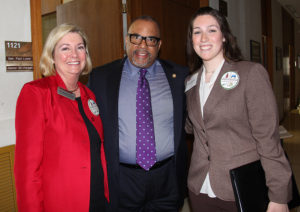
“The legislators that I had the pleasure of speaking with were all very interested in how biosimilars could benefit their districts and the state of North Carolina as a whole. The most memorable interaction I had was my conversation with Senator Paul Lowe, Jr.” says Walter. “After I had introduced myself I told him about our case study of biosimilars. He
proceeded to express his concern regarding patient access and affordable patient care, noting that many of his district’s constituents suffer from terrible health issues but have a difficult time affording the medications required for treatment.”
While Lowe’s concern was pointed, the opportunity it provided to make the most of their interaction was pivotal for Walter. And she was ready, having then spent three years in the realm of drug investigations.
“He then asked me, ‘Do you think biosimilars can make a difference for these individuals?’ I felt a huge responsibility in that moment. I spoke plainly and openly about how biosimilars offer a good opportunity to increase patient access; however, the degree of their success will be determined by many factors, including regulatory and legislative pathways. He continued to say that he was a supporter of the biosimilars bill that had been recently passed (House Bill 195), and he thanked me for our (my team’s) work. I was very touched, because he was genuinely concerned for patients and he seemed to have appreciated our conversation.”
As Walter said later, the exchange between lawmaker and scientist felt like a victory. The evidence points to the fact that biosimilars can perform as well as costlier name drugs. “The BTEC program at NC State has allowed me to utilize the principles I learned in undergrad and apply them in a real world setting,” she says.
“Worldwide legislators have an interest in patient access and affordable healthcare, which makes biosimilars attractive” Walter explains. “However, the innovator of the reference biologic incurs hefty research and development costs up front—so, there is a tension between the innovators and the biosimilar developers….” Walter points out the tension. “From a patient access perspective it’s wonderful; from a patent protection aspect and return on investment for the innovator, it’s not.”
While at NC State, Walter had worked on a case study to evaluate a biosimilar monoclonal antibody. The antibody was similar to a name brand drug at a fraction of the cost.
Last summer, Walter accepted a new job at Merck in Durham, NC, completing her professional science master’s degree in biomanufacturing last fall.
At Merck, her title is associate engineering specialist for deviation management. At the Durham facility she works with products such as the MMR vaccine for measles, mumps, and rubella. “My job at Merck is to investigate/document any deviation in the processing of those vaccines. What we determine within our investigations has a direct effect on the release of our vaccines to market. We have to know it’s safe, effi cacious and pure.”
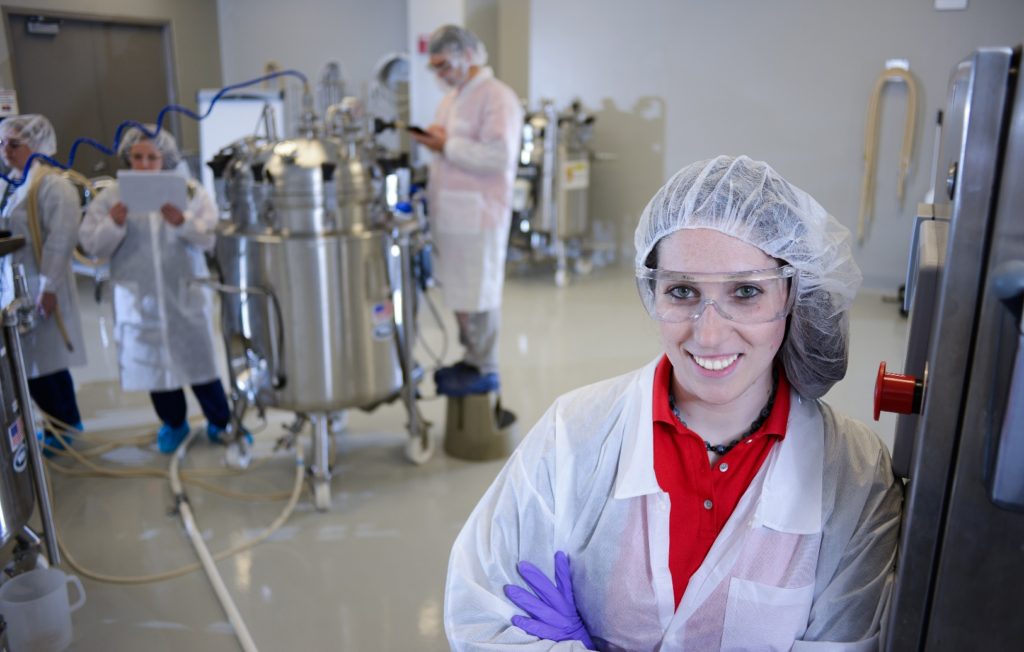
“THINGS THAT WE LEARNED AT BTEC HAVE REAL IMPACT”
For someone with a background such as Walter’s, professional program helped bridge the gap between biology and biotech. “BTEC produces graduates who are ready to enter the biomanufacturing industry,” she explains.
As an undergraduate, she had found herself frightened of certain STEM courses, even though she was interested in complex analysis. BTEC offered a bridge. “While we often applied technology as part of learning and studying these topics, understanding how the technology worked wasn’t always emphasized. I found myself often questioning how the technology was developed, which I now realize is more of an ‘engineering’ mindset. Truth be told, I was scared of complex math, so I
avoided engineering, thinking that I wouldn’t be suited for the field. But as I learned more, I came to discover that it more aligned with my interests in biotechnology and its applications. The BTEC program allowed me to utilize the principles I learned in undergrad and apply them in a real world setting.”
Walter says the program also fed her curiosity about biotechnology, leading her to find her niche in bio manufacturing.
She completed her course work this past December, and attended NC State graduation ceremonies in May 2016. Walter spoke at graduation but says she had reflected over those six months on her message. Her topic was her story. “I spoke about how what we do and learn at BTEC can impact real patients including those close to us. My grandmother was diagnosed with breast cancer this past fall, and is being treated with Herceptin, a biologic. It is a medication that we were able to study during our course work at BTEC because it is an example of the manufacturing principles that we apply at BTEC and within the biomanufacturing industry.”
Walter told the audience, “Things that we learned at BTEC and apply out in the world have real impact…I spoke from the heart.”
She says she was chosen because she voiced to the program manager that she “wanted them to include student speakers and I felt so strongly about BTEC contributing so much to my career. I felt an urgency to publicly thank them.”
Walter sees herself mentoring anyone interested in coming back to school. “A passion for me is women in science. One of my requests for my graduation was a series of textbooks that Michael Flickinger, Ph.D., professor of Chemical and Biomolecular Engineering, edited that contained the technical subject matter we have learned through the program. I requested them as a desk reference; and I asked him to sign the book during graduation.”
She adds, “It’s the passion that drives the science—the faculty is wonderful. NC State has been wonderful for progressing my career and my education, for helping me discover what matters to me and how I can make an impact. We are fond of the state and what it has to offer.”
Then Walter smiles, noting, “NC State is a big part of me now.”
Visit the NC Legislature website and enter HB195 in the Find a Bill box.
What you should know about Biosimilars
1. Biosimilars are therapeutic proteins that provide the same efficacy and safety as a reference (innovator) biological medicine that is already on the market.
2. Unlike small molecule drugs that are chemically synthesized (aspirin, ibuprofen), biological products are proteins produced in living biological systems (e.g. cells).
3. Biosimilars are not “bio-generics” as they are not identical in composition or structure to their on-market reference drug like a small molecule generic is; however, biosimilars are allowed by numerous states to function like generics through substitution at the pharmacy level. As of August 1, 2016 thirty-six (36) states have filed bills or resolutions related to biologics and biosimilar substitution.
4. Since biologics are produced in living systems, they are complex and costly to both develop and manufacture. As biosimilars are modeled after the innovative biologic, companies do not have to invest large amounts of capital and time into the discovery or research development phase of drug development. As such, biosimilars are projected to provide a 20-30 percent reduction in cost per dose. This reduction in cost creates an exciting opportunity for biosimilars to provide more affordable care and increased patient access.
5. In March 2015, the Food and Drug Administration (FDA) approved the first biosimilar for market within the United States. Zarxio™ (Sandoz, Inc.), a biosimilar to Amgen Inc.’s Neupogen® (fi lgrastim), is used to reduce the chance of infection within immunocompromised patients with low white blood cell counts, such as chemotherapy patients.
6. Inflectra™, a biosimilar to Janssen Biotech, Inc.’s Remicade® (Infliximab). Inflectra™ is used to treat inflammatory diseases such as Crohn’s Disease and Ulcerative Colitis and is the second biosimiliar to reach the U.S. market.
Read more from the Graduate School’s Think Magazine.
Download this article as a PDF.
- Categories:
